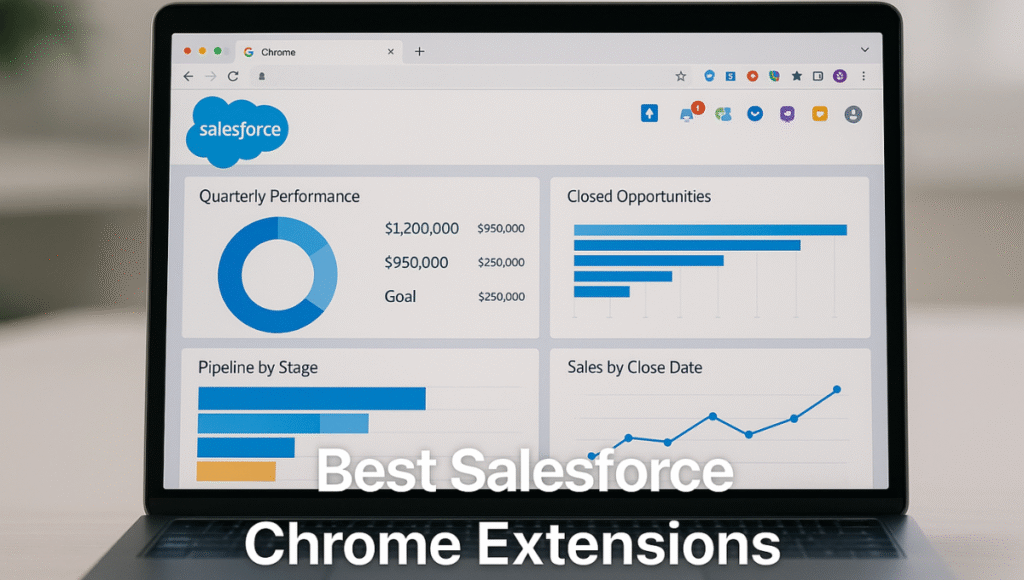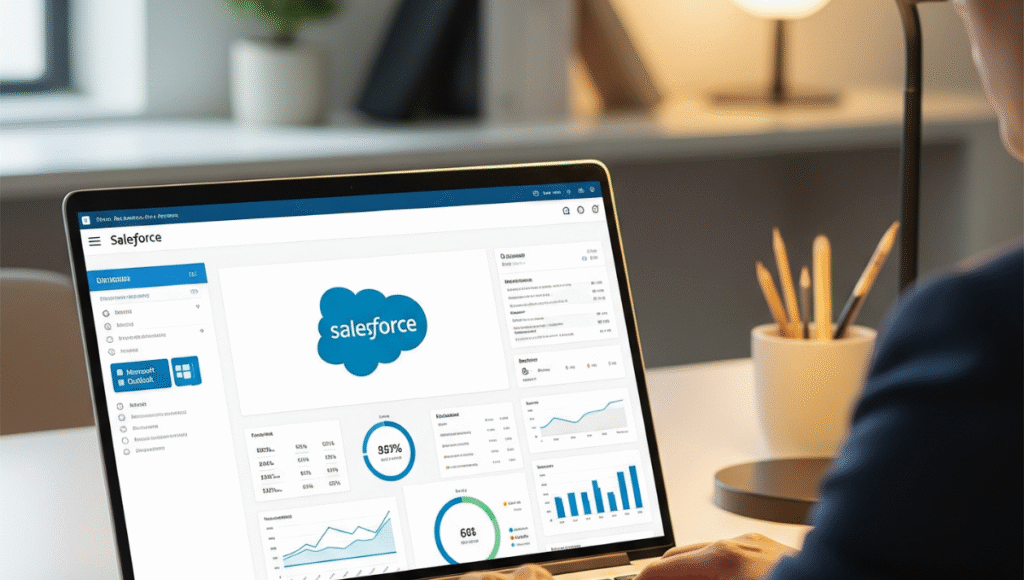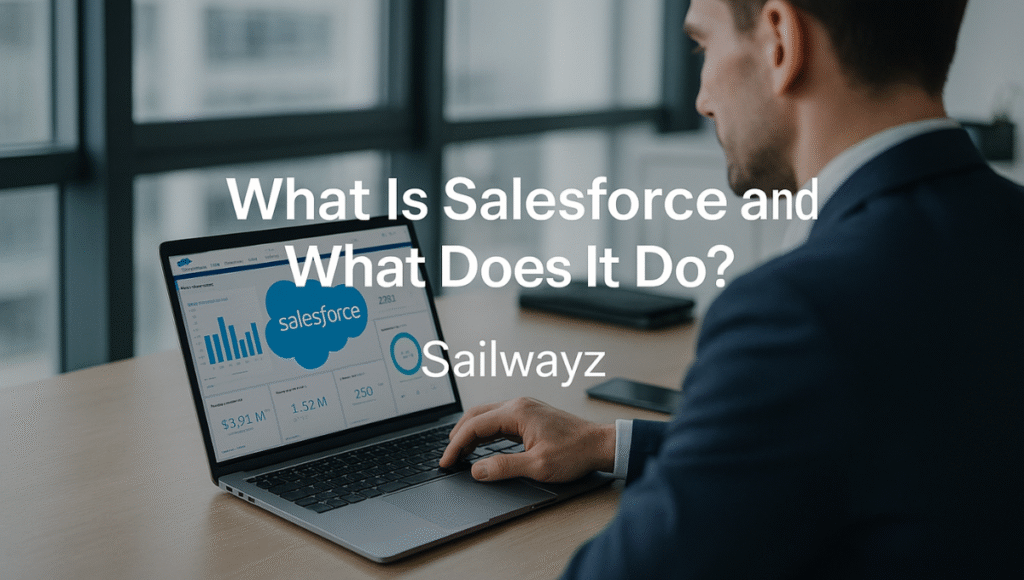
What is Salesforce and why does it seem like every successful business is talking about it?
If you’ve ever struggled to keep track of customer details scattered across spreadsheets, forgotten to follow up on promising leads, or wondered how your competitors manage to deliver such seamless customer experiences, you’re not alone.
Many business owners find themselves drowning in customer data without a clear way to turn it into meaningful relationships and revenue.
That’s where Salesforce comes in the world’s number one Customer Relationship Management (CRM) platform that’s revolutionising how companies connect with their customers.
Salesforce explained for beginners starts with understanding that it’s essentially a digital command centre for your entire customer journey.
Think of it as having a personal assistant who never forgets a customer’s name, remembers every interaction you’ve had with them, and reminds you exactly when to follow up.
But it’s much more powerful than that.
Salesforce is a cloud-based platform that helps businesses manage relationships with customers, prospects, and partners all in one place.
Instead of juggling multiple tools, spreadsheets, and sticky notes, everything lives in the cloud where your entire team can access it from anywhere.
Salesforce CRM meaning goes beyond simple contact management it’s about creating a complete picture of every customer touchpoint, from their first website visit to their latest purchase and beyond.
Salesforce for sales teams transforms how you manage leads, opportunities, and deals.
Imagine never losing track of a hot prospect again because the system automatically reminds you to call them back.
Sales reps can see which marketing campaigns brought in each lead, track deal progress in real-time, and get AI-powered insights about which opportunities are most likely to close.
Key features include:
When customers have problems, Service Cloud ensures they get help fast.
It consolidates support tickets from email, phone, chat, and social media into one unified workspace.
Customer service tools in Salesforce include automated case routing, knowledge bases, and omnichannel support that lets customers start a conversation on one platform and finish it on another seamlessly.
Support teams can see a customer’s entire history, making every interaction more personal and effective.
Marketing automation with Salesforce means no more guessing what content resonates with your audience.
You can create personalised email campaigns, track customer journeys across multiple touchpoints, and automate follow-ups based on specific behaviours.
For example, if someone downloads your pricing guide but doesn’t make a purchase within a week, the system can automatically send them a personalised follow-up email with customer testimonials.
Cloud computing in Salesforce eliminates the headaches of traditional software installations and updates.
Your data lives securely in Salesforce’s data centres, accessible from any device with an internet connection.
This means your sales rep in Manchester can update a customer record, and your support team in Edinburgh sees it instantly.
No more version control nightmares or “I don’t have access to that file” frustrations.
Updates and new features roll out automatically, so you’re always using the latest technology without IT headaches.
Benefits of using Salesforce become apparent quickly when teams stop wasting time hunting for information.
One UK retail company reduced their sales cycle from 90 days to 45 days simply by having all customer information readily available during calls.
When every team member can see a customer’s complete history, interactions become more meaningful.
A support agent can reference a customer’s recent purchase when helping with a question, creating a more connected experience.
Salesforce platform overview includes robust reporting and analytics tools that turn raw data into actionable insights.
You can identify which marketing campaigns generate the highest-value customers, which sales reps need additional training, and which products are trending upward.
As your business grows, Salesforce grows with you.
Add new users, integrate additional tools, and expand functionality without migrating to a completely new system.
Salesforce vs other CRMs often comes down to three key differentiators:
Ecosystem and Integrations Salesforce’s AppExchange marketplace offers thousands of third-party applications that integrate seamlessly. Whether you need accounting software, email marketing tools, or project management capabilities, there’s likely an app for it.
Customisation Flexibility Unlike rigid CRM systems, Salesforce adapts to your business processes rather than forcing you to change how you work. Custom fields, workflows, and automation rules can be configured without coding knowledge.
Innovation and AI Salesforce Einstein brings artificial intelligence to everyday tasks, predicting which leads are most likely to convert, suggesting the best times to contact prospects, and identifying trends in your data.
Salesforce ROI for businesses typically manifests in several measurable ways:
Increased Sales Revenue
Cost Savings
Customer Satisfaction Improvements
Why companies use Salesforce becomes clear when you see results like these:
A Manchester-based manufacturing company increased their sales by 40% within six months of implementation by using automated lead nurturing and better sales forecasting.
A London startup reduced their customer acquisition cost by 30% by identifying their most effective marketing channels through Salesforce analytics.
These aren’t isolated cases they represent the kind of transformation possible when businesses align their customer relationship strategy with the right technology.
Also Check:- what is a salesforce partner
Implementing Salesforce isn’t just about buying software it’s about transforming how your entire organisation thinks about customer relationships.
This is where expert guidance becomes invaluable.
Sailwayz specialises in crafting customised Salesforce solutions that streamline operations and foster growth for UK businesses.
With over 50 combined Salesforce certifications, their team doesn’t just implement the platform they ensure it aligns perfectly with your unique business processes.
Their consultants take time to understand your specific challenges before designing solutions, ensuring every feature serves a genuine business purpose.
From seamless data migration to gradual feature adoption that prevents user overwhelm, they guide organisations through every step of the transformation.
Their ongoing support means you’re never left struggling with technical issues or wondering how to maximise your investment.
Recent client testimonials highlight how Sailwayz has helped businesses streamline lead generation processes, enhance sales efficiency, and unlock new growth opportunities through strategic Salesforce implementations.
Rather than offering generic solutions, they provide tailored approaches that reflect deep understanding of various industries and business models.
Also Read:- what companies use salesforce
Ready to explore how Salesforce could transform your business relationships?
The platform offers various entry points, from small business solutions to enterprise-level implementations.
Consider these factors:
Remember, successful Salesforce implementation isn’t just about the technology it’s about having the right partner to guide your transformation.
Working with certified consultants ensures you avoid common pitfalls and maximise your return on investment from day one.
Salesforce has become the world’s leading CRM platform because it solves real business problems in measurable ways.
From streamlining sales processes and automating marketing campaigns to delivering exceptional customer service, it provides the foundation for sustainable business growth.
The key to success lies not just in choosing Salesforce, but in implementing it strategically with expert guidance.
When done right, businesses see improved productivity, stronger customer relationships, and significant return on investment within months of implementation.
If you’re ready to transform how your organisation manages customer relationships, now you understand what is Salesforce and how it can drive your business forward.
Ready to explore how Salesforce can transform your business? Connect with certified Salesforce consultants who understand UK business needs and can guide your implementation journey from strategy to success.
Q: How much does Salesforce cost for a small business?
Salesforce pricing starts from £25 per user per month for basic CRM functionality. Costs vary based on features needed, number of users, and customisation requirements. Most small businesses find value in the Professional or Enterprise editions.
Q: Can Salesforce integrate with my existing business tools?
Yes, Salesforce offers extensive integration capabilities through its AppExchange marketplace and APIs. Popular integrations include accounting software, email platforms, marketing tools, and industry-specific applications, ensuring seamless workflow continuity.
Q: How long does Salesforce implementation typically take?
Implementation timeframes vary from 6-12 weeks for basic setups to 6+ months for complex enterprise deployments. Factors include data migration complexity, customisation requirements, user training needs, and integration scope.
Q: Is Salesforce suitable for businesses outside of sales?
Absolutely. Salesforce serves marketing teams, customer service departments, nonprofit organisations, healthcare providers, and various other industries. Its flexibility allows customisation for virtually any customer relationship management need beyond traditional sales.
Q: Do I need technical expertise to use Salesforce effectively?
While Salesforce is user-friendly, maximising its potential often requires strategic planning and configuration expertise. Many businesses benefit from working with certified consultants for implementation and ongoing optimisation to ensure successful adoption.










Joshua Eze is the Founder & Salesforce Architect at Sailwayz, a certified Salesforce Consulting Partner based in the UK. With over 6 years of experience leading CRM transformations, he is a certified Application & System Architect passionate about using technology to simplify business processes. Joshua helps companies unlock the full potential of Salesforce with strategic, scalable, and secure solutions.